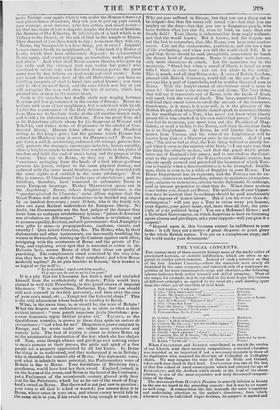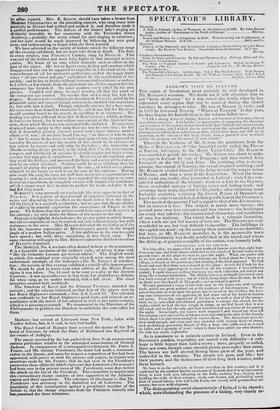THE VOCAL CONCERTS.
Tim management of these concerts betrays none of the marks either of precipitate decision, or slothful indifference, which are often so ap- parent in similar entertainments. Instead of such a selection as that of the last Ancient Concernâwhere the materials were nearly all furnished by the same composer, and consisted only of a wearisome re- petition of his most commonplace songs and choruses,âthe following scheme indicates both active research and skilful grouping. Most of the songs, for example, may be regarded as the most happy illustrations- of different principles as applied to the vocal art; each standing apart from the other, yet all excellent of their kind.
1. Full Anthem " I will arise" CRETORTON.
2. Glee, " Blow thou winter wind" EVE NS.
3. Scene, Mr. I IORNCASTLE. " Darkness" IlanNETT. 4. Madrigal, "Ye Nightingales". 010.n:int/ DI LASSO.. 5. Alia, Miss 'MASSON, " NOD rill di fruit" Moz tier.
6. Glee, "Since first 1 saw " Font). a. Song, Mr. florins, "The mansion of peace" ..... ⢠⢠}%-sitar.
8. Quartet and Churls." To di grazia" 2. Fantasia Oboe, Mr. G. COOKE.
10. Quintet," Rosabelle "
11. Glee.., A chair of bright beauties"
1E. Cantata, Mr. BRA HAM," Let the dreadful engines" 13. Qaintetto, " Seuto. o Dio " 14. Madrigal," fora gave me"
15. Duette." Quel sepulchre" (..4durse) If,. Canzonet, Mrs. 11. U. litsnoi.,":11y mother bids me"
17. G lee, " Where the bee sucks " 18. Round, " To the old " HORSLEY.
ELL ar.
PURCELL.
MOZ ART.
WILIIVE.
PAElt.
HAYDN.
ARNE and JACKSON.
WEDDE,
When CREYGIITON and ALDRICII contributed to enrich the service of our Church with their masterly compositions, a musical education was regarded as an important if not a necessary requisite in those of its dignitaries who assumed the direction of Cathedral or Collegiate choirs. We may imagine the state of those at Wells and Oxford, when such men stood at their head. CREYGIITON was one of the last of that fine school of vocal counterpoint which had adorned the age of Enizaastir ; and the Anthem which stands at the head of the above scheme, is one of the most expressive and truly devotional composi- tions of its class.
The movement from HAYDN'S Passione is scarcely inferior in beauty to the one we heard at the preceding concert : but it was by no means so well sting. A composition like this demands the most scrupulous and undeviating attention to the author's directions; from which wherever even an individual singer deviates, its purpose is marred and IP effect injured. Mrs. E. SEGUIN should have taken a lesson from Madame STOCKHAUSEN at the preceding concert, who sung every note precisely as HAYDN had written and marked it, and therefore made it
a perfect performance. The defects of the former lady's singing are distinctly traceable to her connexion with the Tenterden Street Academy,âprobably the worst school for part-singing in existence ; and her style would be much improved by following her own good taste, and endeavouring to forget what she there learned. We have adverted to the variety of feature which the different songs of the evening exhibited, but we must take them in detail. The first, in every respect, was PURCELL'S Cantata, sung by BRAHAM. This
was one of the boldest and most lofty flights of that immortal writer's genius. We know of no song which demands such an effort on the
part of the singer. He has to depict every feeling and emotion which disappointed love can be supposed to engender in a frenzied mindâthe remembrauce of all his mistress's perkctions, aed'of the happy hours
when " all was sweet and guy," embittered by the recollection of her perfidy : and he has to do this without instiumental assistance or orches- trs1 reliefâa few chords from the pianoforte are all the support that the composer has furnished. Ile must produce every effect by his own powers. Unaided and alone, he must develop all that the mind of the composer has created. No wonder that such a song has had few singers. BARTLEMAN'S enthusiastic devotion to Penenia., aided by his admirable voice and correct though severe taste, enabled him to produce it ; but with him it died. Though originally written for a bass voice, his successors have feared to encounter it ; and it was left for MADAM to add another laurel to his wreath, by recalling it to existence. His reading was often different from that of Baierssmas ; which, perhaps, be had never heard ; for it was seldom sung except at the Ancient Con- certs, from which Baanast was systematically excluded. BARTLEMAN displayed more energy in this song than any one he ever sung; he felt that it demanded 1st eater physical power and a more intense mental effortâ" it was," as we have heard him say, "an illness to him to sing it :" but he never broke loose in such a paroxysm of rage as appeared to convulse Bitaitamâit was the maxim of his school to be correctâhe was ardent by nature and only calm by discipline ; the injunction of Jianulet seeming always present to his mind, that " in the vets- torrent, tempest, and whirlwind of passion, lie should acquire and beget a tern. Terence that may give it smoothness." linanasi, on the contrary, gave way to all his feelings, and measured the force and energy of his expres- sion by no other standard. Nothing could be More touching than his manner of giving the pathetic part of the song ; of which every phrase vibrated to the hearts as %yell as on the ears of his auditors. Having now made the song his own, we shall have many other opportunities of bearing it ; and, as even he must have regarded the attempt as in some degree an experiment, its complete success will impart that confidence wh;ch a singer must feel in order to perfect his work, and give it the last fiM hings touch.
BARNETT'S song proceeds on a principle the very opposite to that of Pout ELI.. It is a piece of instrumental description, indicated by the voice, and depending for its effect on the band rather than the singer. Of its kind, it is a masterly production ; but we question the possibility of realizing by musical expression the conceptions of Brims in this poem. We believe that few writers could have surpassed BARNETT in the attempt ; we only doubt the fitness of the means to the end.
MOZART'S delightful Aria indicates the precise point to which instru- mental accompaniment mav be carried, not only without injury, but with assistance to the voice. Miss ltassoN delivered the recitative as if she felt the immense superiority of METASTASIO'S poetry to the insipid jingle of a modern Italian opera. A few additions to the aria we could have spared ; but with these exceptions, it was finely sung. The same exception will apply to Mrs. Bisnoe's otherwise finished execution of HAYDN'S Canzonet.
The Madrigal, No. 4, we have often desired to hear at these concerts. It is a beautiful specimen of the author's style ; of whom it was said, ,t Hie ilk Orlandus Lassum qui retreat orbem." The English words to which this madrigal were originally adapted, were among the most unfortunate attempts of the translator (31r. N. YONGE) at versifica- tion : the version of this evening exhibited a considerable improvement. We should be glad to know from what edition of the Musica Trans- alpine it was taken. No. 14 used to be sung as a glee at the Ancient Concerts : it was agreeable even in that form, but tenfold more delight- ful when sung, as its author intended, with a full choir. The usual reception awaited both madrigals.
The Dutchess of KENT and the Princess VosrourA attended the concert; and the scheme informed us that four of the pieces were by her Royal Highness's command,âNos. â˘2, 6, 7, and 13. The selection was creditable to her Royal Highness's good taste, and evinced an ac- quaintance with the music of her adopted as well as her native country, which it is pleasing to remark. We recommend to the Directors of the Philharmonic to petition the Dutchess to undertake the same office for them.-



























 Previous page
Previous page